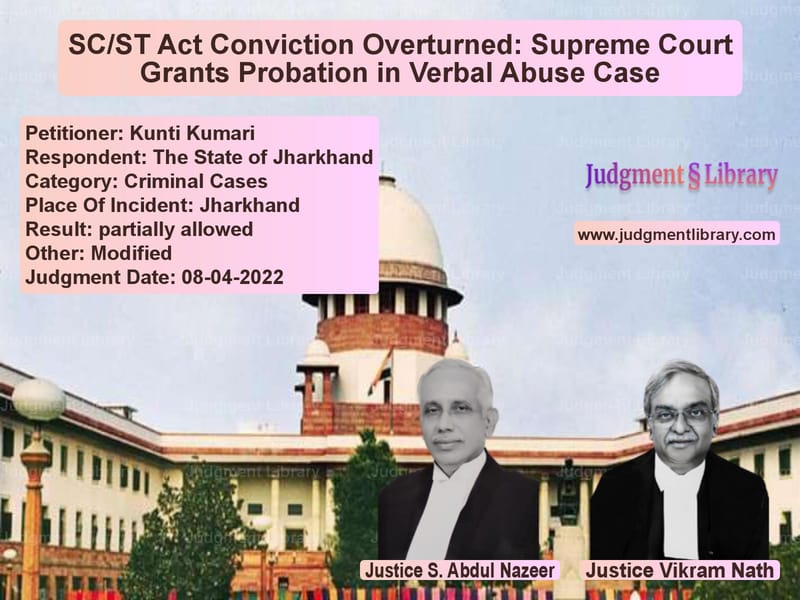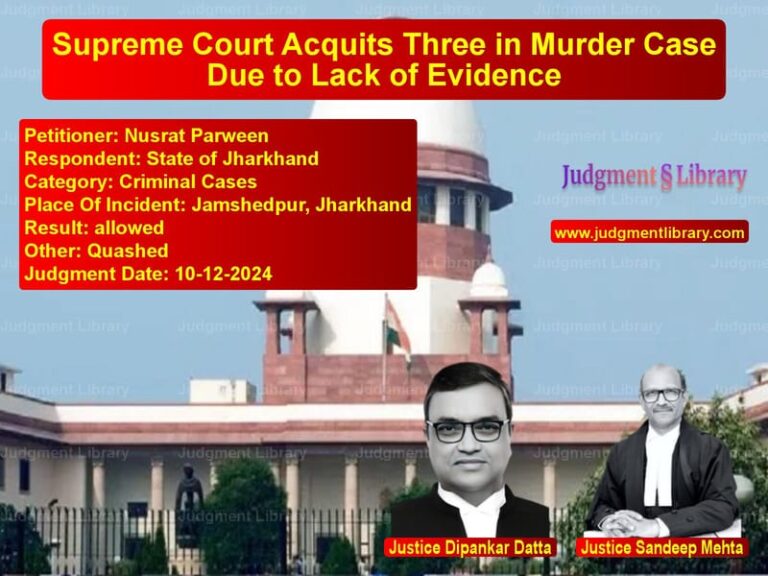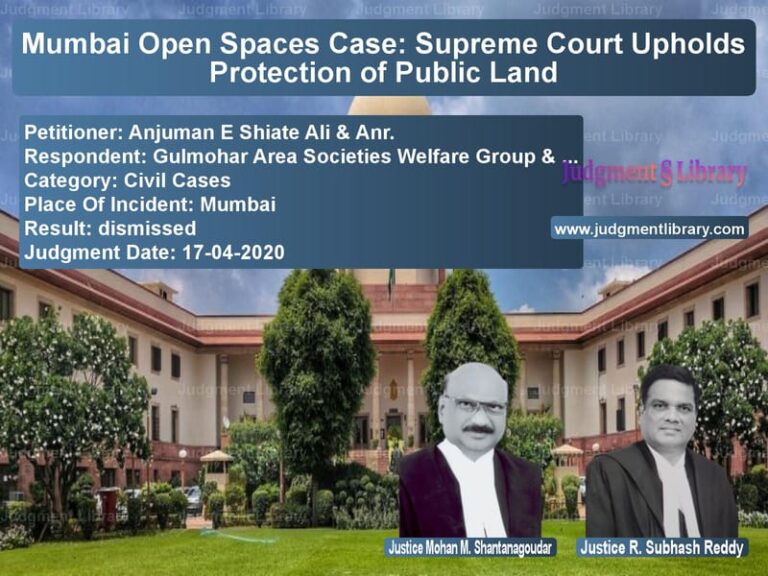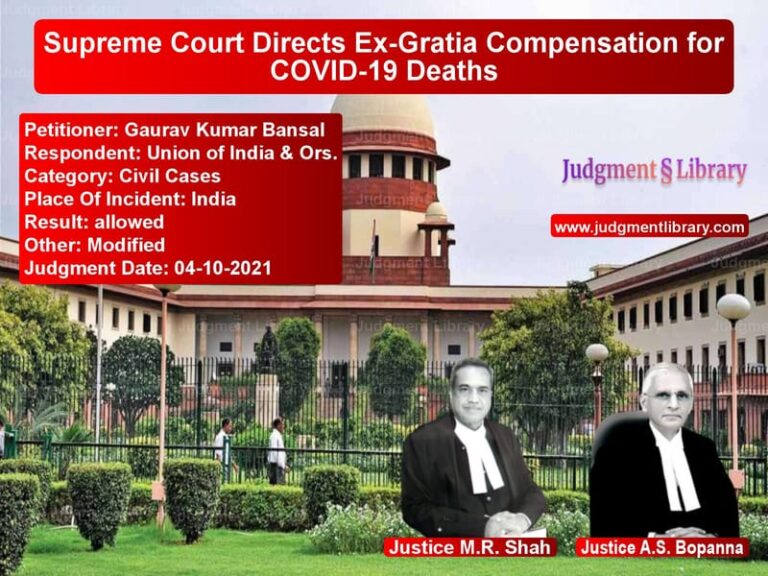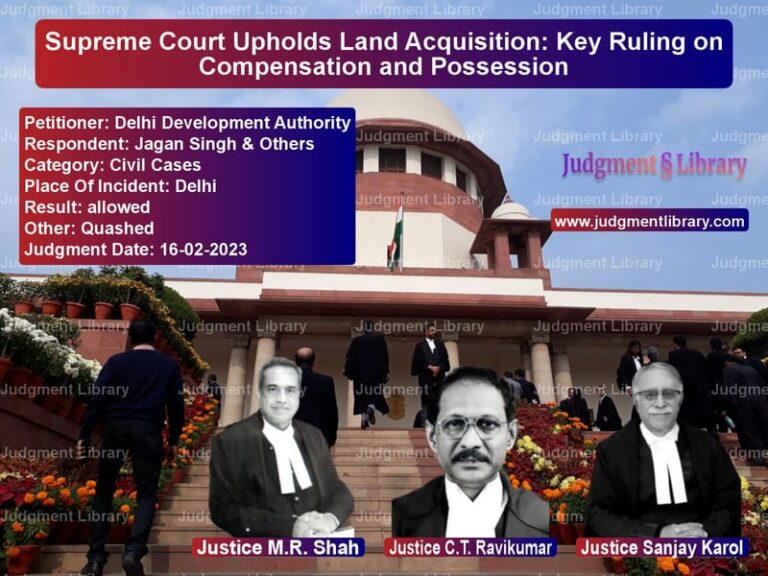SC/ST Act Conviction Overturned: Supreme Court Grants Probation in Verbal Abuse Case
The Supreme Court of India recently ruled on the case of Kunti Kumari vs. The State of Jharkhand, addressing the conviction of the appellant under Section 504 IPC and Section 3(i)(x) of the Scheduled Castes and the Scheduled Tribes (Prevention of Atrocities) Act, 1989. The Court’s ruling set an important precedent regarding the application of the SC/ST Act and the use of the Probation of Offenders Act, 1958.
Background of the Case
The case originated from a complaint filed by Amita Tudu (PW-7), who was the President of the Village Education Committee, Middle School, Kora Para. The incident took place on December 18, 2007, during a budget meeting for the training program of 2008-2009. After the meeting, meal packets were to be distributed to the participants. The complainant alleged that when she was about to hand over a meal packet to the appellant, the appellant snatched the packet, abused her with caste-based remarks, and insulted her in the presence of other teachers and trainees.
The complainant stated that the appellant referred to her as a member of the Santhal tribal community and made derogatory comments, implying that she belonged to a low caste that consumed meat of pigs and cows. Following this, an FIR (No. 05 of 2007) was registered at Jamtara Police Station under Section 504 IPC and Section 3(i)(x) of the SC/ST Act.
Trial Court Proceedings
After investigation, the police filed a charge sheet, and the case proceeded to trial. On August 28, 2010, the trial court convicted the appellant and sentenced her to:
- Four months’ simple imprisonment under Section 504 IPC.
- Six months’ simple imprisonment under Section 3(i)(x) of the SC/ST Act.
The appellant challenged the trial court’s decision in the Jharkhand High Court.
High Court Ruling
The Jharkhand High Court partly allowed the appeal on December 9, 2016, overturning the conviction under the SC/ST Act but upholding the conviction under Section 504 IPC. However, the court reduced the sentence from four months to fifteen days’ simple imprisonment. Dissatisfied with the ruling, the appellant approached the Supreme Court.
Legal Issues
- Whether the conviction under Section 504 IPC should be upheld.
- Whether the provisions of the Probation of Offenders Act, 1958 could be applied to the appellant.
- Whether the offense met the threshold for the SC/ST Act.
Arguments by the Parties
Appellant’s Arguments
- The appellant contended that the trial court and High Court failed to appreciate the facts properly and that the allegations were exaggerated.
- She requested the application of the Probation of Offenders Act, 1958, as she had no prior criminal record.
- The appellant’s counsel argued that the alleged offense did not cause any serious harm and that imprisonment was unnecessary.
State’s Arguments
- The prosecution argued that the appellant had insulted the complainant publicly, which justified the conviction under Section 504 IPC.
- The State contended that caste-based slurs in a public setting constituted an offense under the SC/ST Act, but the High Court had already set aside that conviction.
Supreme Court’s Judgment
Key Observations
- The Supreme Court noted that the conviction under Section 504 IPC had been concurrently recorded by the trial court and the High Court, based on the evidence.
- The Court observed that there was no previous conviction against the appellant, making her eligible for consideration under the Probation of Offenders Act, 1958.
- The Court stated that under Section 3 of the Probation of Offenders Act, first-time offenders guilty of offenses punishable with imprisonment of two years or less may be released after due admonition.
Final Decision
The Supreme Court modified the sentence and allowed the appellant to be released after due admonition under Section 3 of the Probation of Offenders Act, 1958. The Court ruled:
“Considering the facts and circumstances of the case, we deem it appropriate that the appellant may be released instead of carrying out the sentence after due admonition.”
Compensation to the Complainant
The Court noted that the appellant had been directed to pay Rs. 10,000 to the complainant as compensation. Since the amount had already been deposited with the Supreme Court registry, the Court directed that it be transferred to the complainant.
Implications of the Judgment
For Future SC/ST Act Cases
- The judgment reinforces that for an offense to be prosecuted under the SC/ST Act, the intent and context of the act must meet the legal threshold.
- It clarifies that mere verbal abuse, without clear caste-based discrimination and intent to humiliate in a public setting, may not always attract provisions of the SC/ST Act.
For Application of the Probation of Offenders Act
- The ruling highlights the importance of considering probation for first-time offenders when the offense is not of a serious nature.
- It promotes the rehabilitative approach of criminal law over punitive measures in cases of minor offenses.
For Government Employees
- The judgment serves as a caution to public servants regarding workplace behavior and the consequences of using derogatory language.
- It also ensures that minor workplace disputes do not lead to excessive criminalization.
Conclusion
The Supreme Court’s judgment in Kunti Kumari vs. The State of Jharkhand serves as an important legal precedent regarding the application of the SC/ST Act and the use of the Probation of Offenders Act. By setting aside the harsher punishment and granting probation, the Court balanced justice with fairness, ensuring that minor offenses do not result in undue hardship. The ruling also reinforces the principles of criminal justice reform by prioritizing rehabilitation over excessive punitive action in cases involving first-time offenders.
Petitioner Name: Kunti Kumari.Respondent Name: The State of Jharkhand.Judgment By: Justice S. Abdul Nazeer, Justice Vikram Nath.Place Of Incident: Jharkhand.Judgment Date: 08-04-2022.
Don’t miss out on the full details! Download the complete judgment in PDF format below and gain valuable insights instantly!
Download Judgment: kunti-kumari-vs-the-state-of-jharkha-supreme-court-of-india-judgment-dated-08-04-2022.pdf
Directly Download Judgment: Directly download this Judgment
See all petitions in SC/ST Act Case
See all petitions in Bail and Anticipatory Bail
See all petitions in Public Sector Employees
See all petitions in Judgment by S. Abdul Nazeer
See all petitions in Judgment by Vikram Nath
See all petitions in partially allowed
See all petitions in Modified
See all petitions in supreme court of India judgments April 2022
See all petitions in 2022 judgments
See all posts in Criminal Cases Category
See all allowed petitions in Criminal Cases Category
See all Dismissed petitions in Criminal Cases Category
See all partially allowed petitions in Criminal Cases Category

